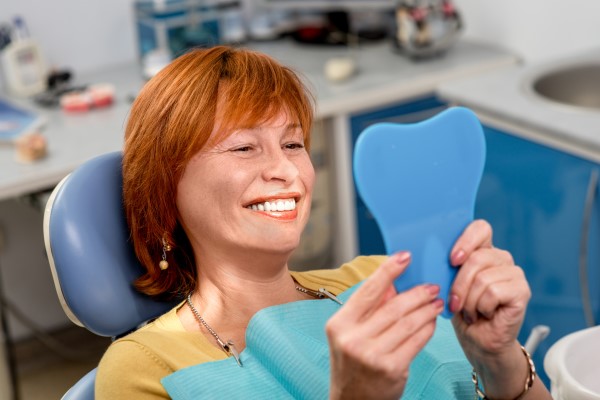How To Care for Dentures

For centuries, people have used dentures to replace missing teeth. The fact that they are still in use today speaks to how practical and effective they can be. Dentures are a popular option for those who are missing multiple teeth and do not have the desire or the ability to undergo extensive dental work. Developments in technology and procedures allow most denture wearers to enjoy a more natural look with a more secure fit than those in the past.
Even though dentures are not at risk for decay like natural teeth, they can still be broken or chipped and may even develop staining without the proper care. They can also develop odors and experience bacterial buildup, which can be unpleasant and even harmful to the wearer. False teeth need daily cleaning and care to protect them from damage and avoid further oral health complaints. Using the right tools and techniques is essential, although these will differ from traditional oral hygiene practices.
How do you clean dentures on a daily basis?
Like natural teeth, dentures need to be cleaned daily. However, you do not clean dental appliances precisely the same way you clean natural teeth. Here are the techniques you need to adopt.
Remove for cleaning
You should brush your false teeth at least once a day, but unless the appliances are fixed in your mouth, you should take them out for cleaning. Plaque can build up on dental appliances just as it can on natural teeth, and while dentures are not susceptible to decay, the bacteria may cause bad breath and lead to gum disease. For this reason, you should also clean inside your mouth when you take your dentures out for cleaning.
Handle with care
When you are brushing your dentures, you should try to get all the crevices and contours. The moist appliances in your hands could be slippery, especially if you are moving them around. If you drop the appliances while brushing them, they could break. Protect them by brushing over a counter upon which you spread a towel to cushion the fall if you drop them. Alternatively, you could brush them over a sink that you fill with water.
Avoid abrasives
When you clean your dentures, use a soft-bristle toothbrush and a cleaning solution intended for artificial teeth. Toothpaste and brushes with stiffer bristles are too abrasive, potentially causing small cracks or scratches on the surface. Instead of toothpaste or denture cleanser, you can also use liquid soap or dish detergent, but be sure to rinse them off before putting them back in your mouth.
Soak overnight
You should not sleep with dental appliances in your mouth, but you also should not allow them to dry out overnight. A lack of moisture can cause them to lose shape, so you should place them in a denture-soaking solution or just a glass of cool water.
Rinse frequently
If you do not brush your false teeth after every meal, at least take them out and rinse them off to remove irritating and potentially bacteria-harboring food particles. You should also rinse them off after you have soaked them overnight in a solution because the chemicals in the solution could be harmful if swallowed.
Avoid hot water
Do not soak your artificial teeth in hot water or use it for cleaning them. Because these dental appliances are made out of plastic, exposure to hot water could cause them to warp.
What else is involved in the care of dentures?
In addition to daily cleaning, you should see your dentist on a regular basis. The dentist can check your oral health, professionally clean the appliances, examine them for damage, and adjust the fit if necessary.
Conclusion
Getting dentures does not replace the need for good oral hygiene. They have to be cleaned and cared for as natural teeth do, though incorporating different techniques is required. With good daily care, you can prevent your dentures from developing unwanted odors and stains while prolonging the overall lifespan of the appliances.
Even though your dentures cannot decay like your natural teeth, it is still important to see a dentist on a regular basis. They can look for any changes and make adjustments as needed while still checking your mouth for signs of other oral health issues. This is especially true if you wear partial dentures and still have some of your natural teeth in place. With excellent daily care and routine checkups, you can enjoy clean, stable, and secure dentures for a healthier, happier smile.
Check out what others are saying about our dental services on Yelp: Dentures and Partial Dentures in Huntsville, AL.
Related Posts
A tooth replacement procedure is vital if you are missing teeth. You will be happy to know that there are multiple options available to restore your smile. If you are missing a few or many teeth but have healthy natural teeth remaining, partial dentures make a lot of sense. This solution can improve your appearance…
Removable artificial teeth are called dentures. They replace permanent teeth lost or extracted due to damage or extensive decay. False teeth are a traditional dental restoration method that has been around for centuries and is still effective today. However, there are things you need to know about them before you start wearing them.Your dentist can…
Partial dentures are a popular replacement option for missing teeth. You could potentially benefit from them if you have lost some of your permanent teeth, but there are still some healthy ones that remain in the jaw. Your dentist can explain if you are a candidate for partials. If you are, you should learn all…
If you are thinking about getting dentures or currently have them, you may have questions. This article explains what dentures are, maintenance requirements, and their impact on dental health.Dentures are custom-made prosthetic teeth and gums that are used to replace missing or extracted teeth. Complete or partial dentures are available, which means they can be…
